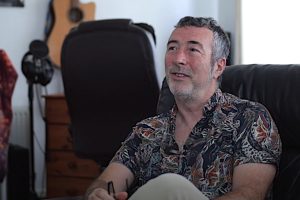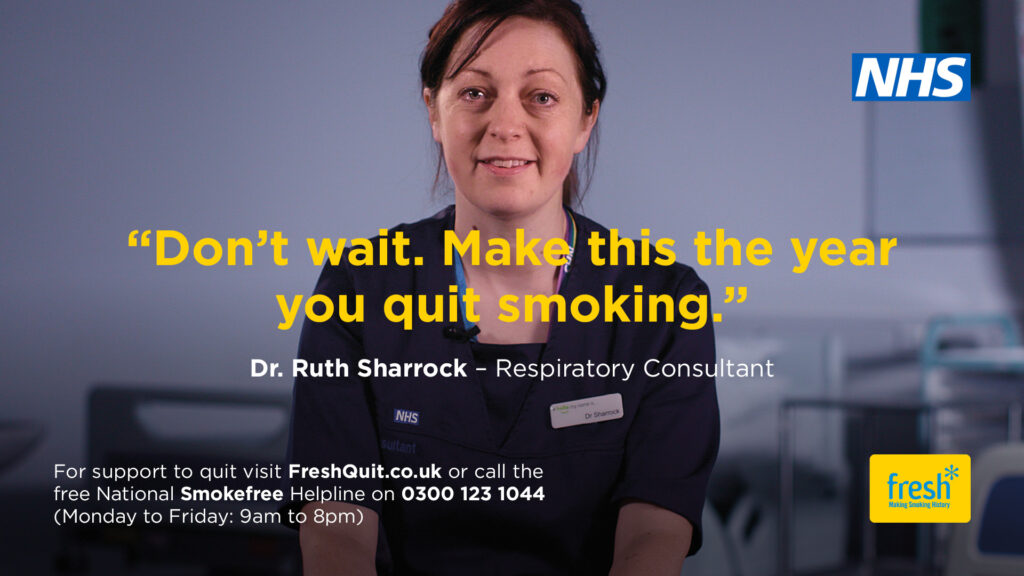Quit smoking in 2023 for better health, more money and less stress
- New Year quit campaign launches in North East and North Cumbria
- New data shows quitting could pay for the average power bill
PEOPLE across the region who smoke are being encouraged to quit this New Year to improve life in 2023 with better health, more money and less stress.
That’s the message from Fresh to encourage smokers to give it another go in 2023 with the launch of the Don’t Wait quit campaign in the North East and North Cumbria.
With the worries of 2022 and cost of living crisis deepening, making a successful quit this New Year can make life so much better:
- A healthier New Year: easier breathing, fewer coughs and colds and less risk of a smoking-caused disease such as cancer, heart attack, stroke and COPD
- More money in the New Year. Life is tough but quitting smoking will give you money you didn’t know you had – around £200 a month
- Less stress: quitting smoking is proven to leave people feeling calmer and happier after a few weeks. If you can get past the first few weeks you can come out the other side with noticeable improvements in mental health
When most people are counting the cost of Christmas, stopping smoking can give you money you never knew you had. Taking tobacco out of your spending could give you an extra £47 a week and extra £2,451 a year [1] which could pay for the average household annual energy bill (£2,500). [2]
Visit the North East quit smoking hub at FreshQuit.co.uk for free advice and quitting support, to see how much extra money you could have in your pocket, and to try the quitting quiz.
The Don’t Wait campaign launches on TV from December 28 across the North East and North Cumbria ICS area with a plea to quit smoking from Dr Ruth Sharrock, a Consultant Respiratory Physician.
One film outlines the immediate benefits of stopping on the body over days and weeks, while another asks people to think about what it would be like receiving terrible news about a smoking-related disease. The Don’t Wait campaign will also be seen and heard on radio, catch-up TV and on Facebook.
Ailsa Rutter OBE, Director of Fresh and Balance, said: “Thousands of people try to stop smoking in January and with this campaign we hope to give people a bit of extra motivation. We recommend people use a quit aid and get free local support to stop to make the process less stressful and more successful.
“Stopping smoking is one of the biggest gifts you can give to your loved ones and to yourself this New Year. There aren’t many things that can bring more money and better health. Quitting can make life a lot better for you and your family – feeling better, more money and less stress.”
Dr Ruth Sharrock, Consultant Respiratory Physician and Clinical Lead for Treating Tobacco Dependency on behalf of North East and North Cumbria NHS, said: “Smoking causes so many serious diseases such as 16 types of cancer, heart disease and stroke. If you smoke you probably know it’s important to quit sooner rather than later– don’t wait another year.
“Smoking also makes you feel worse day to day, can leave you out of breath and cause a persistent cough and make you more vulnerable to chest infections. But the benefits of stopping begin almost immediately as you flush the poisons out of your body and your lungs and circulation start to recover.
“The benefits of quitting just get better as the weeks and months go by and you give yourself the best chance to be around with your family in the future.”

Smoking and poverty
New analysis in time for New Year as the cost of living crisis deepens shows smokers could pay for an average household power bill by quitting.
In the North East a staggering 42% of households where someone smokes are living in poverty. Smoking is also costing the average person who smokes around £2451 a year.
Action on Smoking and Health (ASH) has published a new smoking and poverty briefing [1] which highlights smoking as a key driver of inequalities in wealth as well as health.
Smokers may be spending around £2,451 a year which could offset the average household’s annual energy bills (£2,500). By taking action to quit for 2023, smokers can improve their health and wellbeing as well as gaining a significant cash boost to offset household bills for fuel or food, or even pay towards a treat for them or their families.
Nationally 1.5 million households including smokers lived in poverty containing 2.2 million working age adults, 1 million children and 400,000 pensioners. [3]
Deborah Arnott, Chief Executive of ASH, said: “Smoking is a costly addiction, and the vast majority of smokers become addicted as children. [4] This is an addiction which drives and exacerbates inequalities in wealth as well as health.
“The impact of smoking on poverty varies between different regions and the North East has the lowest gross disposable household income in the country [5], so experiences the worst impact.
“These figures clearly show that by helping people stop smoking doesn’t just improve health it can also alleviate poverty.”
How smoking harms health
Smoking causes 16 types of cancer, heart disease, dementia, stroke and COPD and makes us more vulnerable to infectious diseases such as Covid and flu.
Stopping smoking can also reduce stress and improve mental health with the benefits seen after just six weeks. [6]
Your chances are improved if you use a quitting aid or switching completely to vaping to reduce cravings. There are free local Stop Smoking Services near you which can help you develop a plan to help you stop. With their help, you’re three times as likely to quit for good.
How your body recovers after quitting
After 20 minutes
Your pulse rate starts to return to normal.
After 8 hours
Your oxygen levels are recovering, and the level of harmful carbon monoxide in your blood will have reduced by half.
After 48 hours
All carbon monoxide is flushed out. Your lungs are clearing out mucus and your senses of taste and smell are improving.
After 72 hours
If you notice that breathing feels easier, it’s because your bronchial tubes have started to relax. Also your energy will be increasing.
After 2-12 weeks
Blood will be pumping through to your heart and muscles much better because your circulation will have improved.
After 6 weeks:
Smokers who stop have better mental health than those who continue to smoke. One study found that benefits could be seen as soon as six weeks and were maintained even a number of years after stopping.
After 3-9 months
Any coughs, wheezing or breathing problems will be improving as your lung function increases.
After 1 year
Great news! Your risk of heart attack will have halved compared with a smoker’s.
After 10 years
Your risk of death from lung cancer will have halved compared with a smoker’s.
More ways to quit than ever
treatments are available from shops, pharmacies and on prescription to help you beat your addiction and reduce withdrawal symptoms:
Nicotine Replacement Therapy provides you with a low level of nicotine, without the tar, carbon monoxide and other poisonous chemicals in tobacco smoke.
E-cigarettes allow people to inhale nicotine without most of the harmful effects of smoking, as the vapour contains no tar or carbon monoxide. Research has found that e-cigarettes can help you give up smoking, so you may want to try them rather than the medications listed above. E-cigarettes are not currently available on prescription, although vaping is much cheaper than smoking.
Extra cash when you quit
The cost of living is a worry for everyone but quitting smoking can save you a packet. The average smoker could be saving a packet by stopping:
- £47 after one week quit.
- £92 after two weeks quit.
- £204 after a month quit.
- £1225 after six months quit.
- £2,451 in a year

References
[1] ASH Smoking and Poverty briefing https://ash.org.uk/uploads/Smoking-and-Poverty-Briefing.pdf. ASH will be issuing their PR on Wednesday 21st December.
[2] Based on October 2022 figures when the average energy cost was capped at £2,500 according to the BEIS Energy Price Guarantee Policy Paper updated 29 November 2022
[3] Landman Economics – Estimates of poverty in the UK adjusted for expenditure on tobacco, 2021 update
[4] Delivering a Smokefree 2030: The All Party Parliamentary Group on Smoking and Health recommendations for the Tobacco Control Plan 2021. London: APPG on Smoking and Health. 2021.
[5] ONS. Regional gross disposable household income, UK: 1997 to 2019. 14 October 2021. Accessed 12th December 2022.
